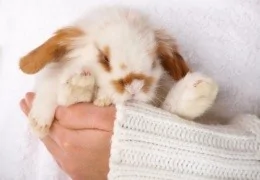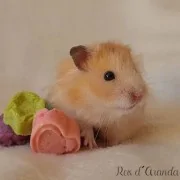Its name says it all: the Vienna blue rabbit comes from Austria. Not only is it beautiful with its shiny blue-grey...
BENEFITS OF YOUR BABY GROWING UP WITH A PET
INTRODUCTION
According to a study conducted by Western Carolina University in the United States, the connection between people and pets is a very positive experience for many families and, in many cases, the bonds between pets and owners can be especially strong, including the youngest members of the household.
In a report of 22 studies examining the relationship between pets and children, the authors found that pets can have a positive impact on children's overall well-being. Growing up with pets is linked to increased self-esteem, social skills and even cognitive development. Let's take a closer look at why these domestic creatures are so special.
WHY IS IT GOOD FOR A BABY TO GROW UP WITH PETS AT HOME?
Having a pet at home is good therapy for many people, as it helps to combat loneliness. Moreover, interacting with them, petting them and playing with them helps to reduce stress. All these benefits are even more evident when living with children.
However, it is also important to remember that having a pet at home also comes with responsibilities and care, such as ensuring that the pet is well cared for, has a proper diet and receives regular medical attention.
BENEFITS DURING A BABY'S GROWTH
Research shows that pets support the growth and development of children of all ages, but they bring some unique benefits to young children. Here are some key reasons to consider bringing a pet into your home.
RESPONSIBILITY
One of the reasons parents and caregivers may (or may not) want a pet is the fact that they require care and attention. If you work full time and have a young child with lots of energy, the idea of grooming and feeding another living creature can be daunting. However, young children learn a lot about responsibility by doing simple tasks such as filling the pet's water bucket or spreading the food in the fish tank. These small but meaningful tasks not only teach responsibility, but also increase a child's self-confidence.
IMPROVED SOCIAL AND VERBAL SKILLS
Pets can also serve to develop social skills. Even more so in the case of young children who have a slow-animating temperament. Although they may be reluctant to communicate with other humans, a pet can evoke expressive language and invite new vocabulary as they learn more about the animal.
EMPATHY
When children learn to care for a pet, they also learn to put themselves in each other's shoes. Lessons on how to feed a pet at the right times, not to disturb it while it sleeps or why you should never take away its favourite toy can help children understand how to be kind, loving and respectful. Caring for a pet also emphasises Theory of Mind, which helps children understand that others have different thoughts and feelings than they do.
EMOTIONAL BENEFIT
If there is one demographic that can really benefit from the emotional support of animals, it is young children. They experience big emotions that can be complicated to process. When it comes to feeling angry, sad or even embarrassed, the comfort of an animal can be an extraordinary source of support for a child. Pets are loyal, non-judgmental and offer unconditional love. Pets can calm young children during emotional times and help them learn to express, name and understand their own emotions.
BENEFITS OF PETS ON BABY'S HEALTH
PHYSICAL HEALTH
Children who grow up with pets tend to have better overall health and are likely to be more active. Pets that require regular exercise help young children understand the value of movement throughout the day. In addition to exercise, a study published by the American Academy of Pediatrics found that babies who grow up with pets - especially dogs - are less likely to develop colds and other respiratory infections as toddlers.
A STRONGER IMMUNE SYSTEM
In the 0-12 month stage, babies who grow up with pets tend to have fewer respiratory problems and develop fewer allergies. They have also been shown to suffer less from ear infections and use fewer antibiotics than babies who have grown up without a pet. Having a pet at home will help your baby be better prepared to face the world with a stronger immune system.
FEWER EAR INFECTIONS
Researchers from the University of Finland conducted an interesting study for the journal ‘Pediatrics’ which concluded that babies under one year old who live with dogs or cats are 30 percent less likely to suffer from coughs, rhinitis or fever. In addition, the same study reveals that the likelihood of these babies getting ear infections is reduced by half.
STRESS REDUCTION
As a study by the University of Florida shows, children who interact with dogs have lower cortisol (stress hormone) levels than those who don't, and can help them learn to cope better with stress even as adults.
In addition, pets can be a source of emotional support for children and provide them with an unconditional source of love and affection, which helps them feel more accepted and valued and increases their self-esteem.
EDUCATION AND REGULAR VETERINARY VISITS
Although coexistence between a baby and animals is almost always possible, it is necessary to keep some aspects in mind, such as:
- Keeping regular visits to the vet to make sure that the animal is in perfect health.
- Train and educate your dog to be obedient in case it is necessary to separate it at some point from the baby.
- Make introductions between dog/cat and baby slow and gradual. If your pet was already at home before the arrival of the baby, it is normal for it to take a little time to get used to the baby's presence. The arrival of a baby will disrupt their routine and make them very curious about what it is.
- Never leave a baby or child alone with a dog or other animal that could harm them. No matter how well-behaved your pet is, sometimes children become very insistent with them and may react aggressively.
- Evaluate how your pet reacts to the baby, and if you are not sure, contact an ethologist to help you understand your pet's language.
- Get your pet used to new sounds, objects and even smells related to the baby that may alter its daily routine.
- Use safety barriers to guarantee your pet's safety, of a height of approximately 1.5 metres while your pet is between 0 and 5 years old.
CONCLUSION
As you can see, there are many benefits that pets bring to children. But above all, pets are able to bring great joy to our homes, which cannot be achieved in any other way. Pets end up becoming part of the family and their company is reason enough to be happy.
Leave a comment
Log in to post comments
















